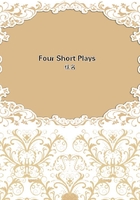There is no doubt in my mind that nature designed me for a great painter. A railway director interfered with that design of nature, as he has with many another of hers, and by the transmission of an order for mountain pieces by the dozen, together with a cheque so large that I feared there was some mistake, he determined me to be an illustrator and designer for railway and like publications. Ido not like these people ordering 'by the dozen.' Why should they not consider an artist's finer feelings? Perhaps they cannot understand them; but they understand my pictures, and I understand their cheques, and there we are quits. But so it came that Iremained in Black Rock long enough to witness the breaking of the League.
Looking back upon the events of that night from the midst of gentle and decent surroundings, they now seem strangely unreal, but to me then they appeared only natural.
It was the Good Friday ball that wrecked the League. For the fact that the promoters of the ball determined that it should be a ball rather than a dance was taken by the League men as a concession to the new public opinion in favour of respectability created by the League. And when the manager's patronage had been secured (they failed to get Mrs. Mavor's), and it was further announced that, though held in the Black Rock Hotel ballroom--indeed, there was no other place--refreshments suited to the peculiar tastes of League men would be provided, it was felt to be almost a necessity that the League should approve, should indeed welcome, this concession to the public opinion in favour of respectability created by the League.
There were extreme men on both sides, of course. 'Idaho' Jack, professional gambler, for instance, frankly considered that the whole town was going to unmentionable depths of propriety. The organisation of the League was regarded by him, and by many others, as a sad retrograde towards the bondage of the ancient and dying East; and that he could not get drunk when and where he pleased, 'Idaho,' as he was called, regarded as a personal grievance.
But Idaho was never enamoured of the social ways of Black Rock. He was shocked and disgusted when he discovered that a 'gun' was decreed by British law to be an unnecessary adornment of a card-table. The manner of his discovery must have been interesting to behold.
It is said that Idaho was industriously pursuing his avocation in Slavin's, with his 'gun' lying upon the card-table convenient to his hand, when in walked policeman Jackson, her Majesty's sole representative in the Black Rock district. Jackson, 'Stonewall'
Jackson, or 'Stonewall,' as he was called for obvious reasons, after watching the game for a few moments, gently tapped the pistol and asked what he used this for.
'I'll show you in two holy minutes if you don't light out,' said Idaho, hardly looking up, but very angrily, for the luck was against him. But Jackson tapped upon the table and said sweetly--'You're a stranger here. You ought to get a guide-book and post yourself. Now, the boys know I don't interfere with an innocent little game, but there is a regulation against playing it with guns; so,' he added even more sweetly, but fastening Idaho with a look from his steel-grey eyes, 'I'll just take charge of this,'
picking up the revolver; 'it might go off.'
Idaho's rage, great as it was, was quite swallowed up in his amazed disgust at the state of society that would permit such an outrage upon personal liberty. He was quite unable to play any more that evening, and it took several drinks all round to restore him to articulate speech. The rest of the night was spent in retailing for his instruction stories of the ways of Stonewall Jackson.
Idaho bought a new 'gun,' but he wore it 'in his clothes,' and used it chiefly in the pastime of shooting out the lights or in picking off the heels from the boys' boots while a stag dance was in progress in Slavin's. But in Stonewall's presence Idaho was a most correct citizen. Stonewall he could understand and appreciate. He was six feet three, and had an eye of unpleasant penetration. But this new feeling in the community for respectability he could neither understand nor endure. The League became the object of his indignant aversion, and the League men of his contempt. He had many sympathisers, and frequent were the assaults upon the newly-born sobriety of Billy Breen and others of the League. But Geordie's watchful care and Mrs. Mavor's steady influence, together with the loyal co-operation of the League men, kept Billy safe so far. Nixon, too, was a marked man. It may be that he carried himself with unnecessary jauntiness toward Slavin and Idaho, saluting the former with, 'Awful dry weather! eh, Slavin?' and the latter with, 'Hello, old sport! how's times?' causing them to swear deeply; and, as it turned out, to do more than swear.
But on the whole the anti-League men were in favour of a respectable ball, and most of the League men determined to show their appreciation of the concession of the committee to the principles of the League in the important matter of refreshments by attending in force.
Nixon would not go. However jauntily he might talk, he could not trust himself, as he said, where whisky was flowing, for it got into his nose 'like a fish-hook into a salmon.' He was from Nova Scotia. For like reason, Vernon Winton, the young Oxford fellow, would not go. When they chaffed, his lips grew a little thinner, and the colour deepened in his handsome face, but he went on his way. Geordie despised the 'hale hypothick' as a 'daft ploy,' and the spending of five dollars upon a ticket he considered a 'sinfu' waste o' guid siller'; and he warned Billy against 'coontenancin' ony sic redeeklus nonsense.'














